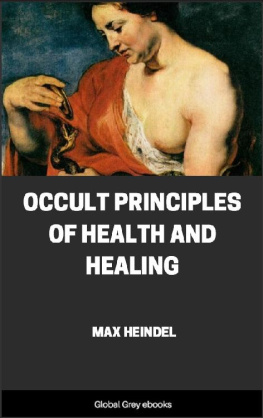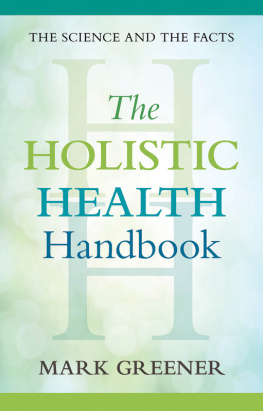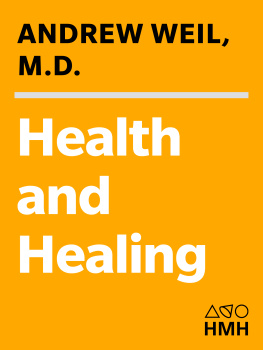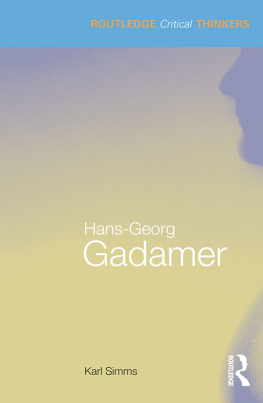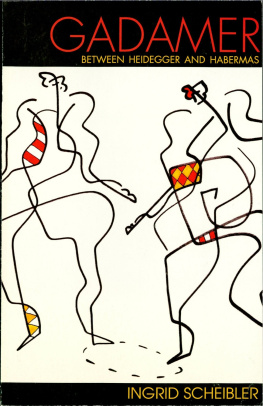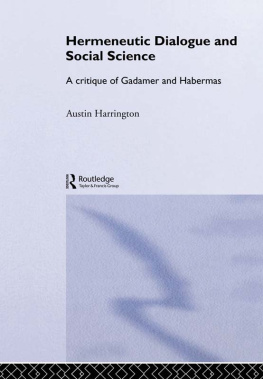Contents
This English translation: chapter 1 copyright Social Research 1977; all other chapters Polity Press 1996. First published in German as ber die Verborgenheit der Gesundheit copyright Suhrkamp Verlag, 1993. This translation first published by Polity Press in association with Blackwell Publishers Ltd, 1996.
Published with the financial support of Inter Nationes, Bonn.
Reprinted 2004
Polity Press
65 Bridge Street
Cambridge, CB2 1UR, UK
Polity Press
350 Main Street
Maiden, MA 02148, USA
All rights reserved. Except for the quotation of short passages for the purposes of criticism and review, no part of this publication may be reproduced, stored in a retrieval system, or transmitted, in any form or by any means, electronic, mechanical, photocopying, recording or otherwise, without the prior permission of the publisher.
Except in the United States of America, this book is sold subject to the condition that it shall not, by way of trade or otherwise, be lent, re-sold, hired out, or otherwise circulated without the publishers prior consent in any form of binding or cover other than that in which it is published and without a similar condition including this condition being imposed on the subsequent purchaser.
ISBN 0-7456-1367-5
ISBN 0-7456-1594-5 (pbk)
A CIP catalogue record for this book is available from the British Library.
For more information on Polity visit our website:www.polity.co.uk
Preface
It has always been a particular occasion that has prompted me to speak about problems of health care and the art of medicine. The results are gathered together in this small volume. It should not be a cause for surprise if a philosopher who is neither a doctor nor feels himself to be a patient nevertheless wishes to participate in the discussion concerning the broad range of problems which arise in the field of health in the scientific and technological age. Nowhere else do the advances of modern research enter so directly into the sociopolitical arena of our time as they do in this area. The physics of our century has taught us that there are limits to what we can measure. And in my opinion this fact alone merits strong hermeneutical interest. This is even more the case when we are concerned not just with the quantifiability of nature but with living human beings. The limits of what can be measured and, above all, of what can be effected through human intervention reach deep into the realm of health care. Health is not something that can simply be made or produced. But what then is health itself? Can it become an object for scientific investigation in the same way that it becomes an object for the individual when the balance of health is disturbed? For the ultimate aim after all must be to regain ones health and thereby to forget that one is healthy.
At the same time, the domain of science constantly extends into the realm of life itself. When it is a question of applying scientific knowledge to our own health, it is clear that we cannot be treated solely from the perspective of science. Here everyone has their own experiences and expectations. This is particularly true for all those disputed marginal areas of medical science such as pyschosomatic medicine, homoeopathy, so-called natural healing methods, hygienics, the pharmaceutical industry and all the ecological aspects involved. And this is also true for the care of the chronically ill and the old in the community. The ever growing costs involved here effectively demand that health care once again be acknowledged and recognized by the entire population as their shared responsibility.
The contributions offered here are not simply addressed to doctors, although most of them were originally presented to them as lectures, or again solely to patients, but rather to each and every one of us who must take care of our own health through the way in which we lead our lives. This particular responsibility which each person bears expands into a much broader dimension of responsibility in our highly complex civilization. Everywhere we find ourselves in possession of intensified human technical capacities which are as astounding as they are disturbing and the task is to integrate these new capacities into the social and political order as a whole. For centuries our entire culture has neglected to face up to these new demands. We have only to recall the humanitarian optimism which animated the eighteenth century and compare that with the general mood at the close of the twentieth century in this our age of mass civilization. We might think here of the immense increase in weapons technology and the destructive potential it harbours; or of the dangers posed to the conditions of human life by the technological progress from which we all benefit; and then again of the arms trade, which is as difficult to control as the drugs trade; and not least of the deluge of information which threatens to engulf our human faculty of judgement.
The enigma of health is just one small example from the range of problems which confront us. Everywhere it is a question of finding the right balance between our technical capacities and the need for responsible actions and choices. Within this whole area the problem of cultivating and caring for health represents something which directly concerns everyone. Thus we are forced to recognize that there are limits to what we can do, limits which are taught to us by illness and death. Care for our own health is an original manifestation of human existence.
Chapter 1 appeared originally in Neue Anthropologie , ed. Paul Vogler and H.-G. Gadamer, vol. 1 (New York and Stuttgart, 1972), pp. 937. It was slightly modified by the author for its first publication in English under the title Theory, Technology, Practice: The Task of the Science of Man, translated by Howard Brotz, in Social Research , vol. 44 (Fall 1977), New York. The publishers are grateful for permission to reproduce that translation here, where it appears with modifications.
Chapter 2 appeared originally in Festschrift fr Paul Vogler (Leipzig, 1965) and was also published in vol. 1 of H.-G. Gadamer, Kleine Schriften (3 vols, Tbingen: J. C. B. Mohr, 1967), pp. 21119.
Chapter 3 was given as a lecture to a meeting of the Gesamtverband Deutscher Nervenrtze in Wiesbaden in September 1963 and appeared as Philosophische Bemerkungen zum Problem der Intelligenz, Der Nervenarzt , vol. 7 (Heidelberg, 1964), pp. 2816.
Chapter 4 was given as a radio broadcast for the Heidelberg studio of the Sddeutscher Rundfunk on 10 October 1983 and appeared in H.-G. Gadamer, Gesammelte Werke (Tbingen: J. C. B. Mohr, 1985), vol. 4, pp. 28894.
Chapter 5 appeared in Festschrift aus Anla der Verleihung des Dr. Margit Egnr-Preises 1986 (Dr Margit Egnr Foundation, 1986), pp. 3343.
Chapter 6 appeared in Viktor von Weizscker zum 100. Geburtstag ( Schriften zur anthropologischen und inter disziplinar en Forschung in der Medizin , vol. 1), ed. Peter Hahn and Wolfgang Jacob (Berlin and Heidelberg, 1987), pp. 4550.
Chapter 7 appeared in Das Philosophische und die praktische Medizin ( Brcken von der Allgemeinmedizin zur Psychosomatik , vol. 4), ed. Helmut A. Zappe and Hansjakob Mattern (Berlin and Heidelberg, 1990), pp. 3744.
Chapter 8 appeared in Erfahrungsheilkunde, Acta medica empirica: Zeitschrift fr rztliche Praxis , vol. 40, no. 11 (1991), pp. 8048.
Chapter 9 appeared as ber den Zusammenhang von Autoritt und kritischer Freiheit in Schweizer Archiv fr Neurologie, Neurochirurgie und Psychiatrie , vol. 133, no. 1 (Zurich, 1983), pp. 1116.




